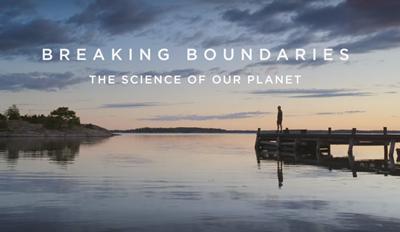University of Southampton graduate is Breaking Boundaries to avert planetary crisis

A new book co-authored by a University of Southampton graduate reveals the full scale of the planetary emergency now facing humanity and explains that if we act now, we can stabilise Earth’s life support system.
Breaking Boundaries: The Science of our Planet, written by Owen Gaffney (BEng Aeronautics and Astronautics, 1991) and Johan Rokstrom, is also the title of a hard-hitting new Netflix documentary narrated by Sir David Attenborough available from 4th June.
With a foreword by environmental campaigner Greta Thunberg, the book is about the most important discoveries of our age and reveals the many pressures that humans are placing on our planet.
“We have sliced, diced and simplified Earth’s life support system,” says Gaffney, a science writer and global sustainability analyst based at the Stockholm Resilience Centre, Potsdam Institute for Climate Impact Research and the Global Commons Alliance. “The cracks are already appearing in the Arctic, Antarctica, the Amazon rainforest, the Atlantic Ocean and coral reefs worldwide.
As well as highlighting the stressors inflicted on the planet, Breaking Boundaries provides hope by illustrating tangible solutions. The book is split into three acts: planetary awareness - what do we know about our planet; planetary boundaries and the concept of the Anthropocene period in our history – what is our current emergency and what risks are societies taking with our future; and planetary stewardship – how to become good stewards of the planet, or we may not be around for long.
The work concludes optimistically with key tipping points identified that are gaining momentum and provide hope for the future including the positive impact of disruptive societal movements, the changing political landscape the economic shift in the price of green energy and technological advancements.
“Planetary stewardship is growing and we predict the next decade will see the most rapid transformation in history but will it be fast enough to avoid the worst catastrophes?,” asks Gaffney. “As a species, we humans tend to do the right thing but only after we’ve exhausted other alternatives.”
Gaffney and his co-author, a leading global sustainability scientist and chief scientist at Conservation International, see Breaking Boundaries as a call to action for the whole planet, as does the documentary’s director Jon Clay.
The film has also prompted Christiana Figueres, an internationally-recognised leader on global climate change to say that Breaking Boundaries is “probably the most important documentary that has ever been filmed.”
Figueres, who is the former Executive Secretary of the United Nations Framework Convention on Climate Change (2010-16) that helped to deliver the Paris Agreement in 2015, went on to say that the documentary “really explains, from a scientific point of view, how much of an emergency we’re in, not just on climate but also on all of the other boundaries; so if you needed scientific proof for your sense of urgency, there you are.”
“We are at a critical moment in history and this next decade will be decisive for our civilisation,” Gaffney explains. “Do we bequeath our children a dangerously destabilised planet, or do we bequeath a healthy, resilient biosphere and relatively stable planet?
“These are the options right now but I am optimistic we will act at scale,” he continues. “The door is still open and will become planetary stewards. What do people need to do? Vote for parties that value science and value the future. Consume with purpose. Become nature positive. Give back. The big paradigm shift is not ‘tread lightly’ it is regenerate.”
When Gaffney graduated from the University of Southampton, one thing that really interested him was the global environment.
“This was the early 1990s and Earth observation satellites were starting to bring back startling images of the state of the planet,” he recalls. “I remember seeing NASA’s first ‘Earth At Night’ composite image and just being blown away. This literally changed my perspective, my worldview, in a single breath.
“To me, it is a more important image than the famous ‘EarthRise’,” he adds. “When I finished my degree I felt a bit lost. I did not want to work in the aerospace industry because this is often linked to the military. I took the scenic route for a while. I wrote, I worked in restaurants, I started teacher training, I did a film course. I then worked in film and video production and became a science writer at the moment climate change was rising to the top of the political agenda.
“Now, we are on the brink of a crucial moment in history so Breaking Boundaries is an essential work that presents a vision of our contemporary world based on a new understanding of our rainforests, ice sheets, oceans, atmosphere and rich diversity of life,” he concludes.
The book, Breaking Boundaries: The Science of our Planet is published by Dorling Kindersley.
The Netflix documentary, of the same title and narrated by Sir David Attenborough, will be available from 4th June 2021.